|
Read about
more faculty achievements in
Faculty News.
NEW
WEBSITE FOR Network for Clinical Research
The College of Medicine’s
Network for Clinical Research, created to improve Floridians’ health through
high-quality research in community-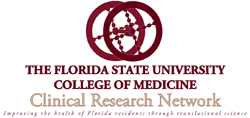 based
settings, now has
its own website. Among other news, visitors to
the site learn about the CRN’s inaugural pilot studies in collaboration
with the University of Florida’s Clinical and Translational Science
Institute. based
settings, now has
its own website. Among other news, visitors to
the site learn about the CRN’s inaugural pilot studies in collaboration
with the University of Florida’s Clinical and Translational Science
Institute.
In a letter to the faculty and staff, Senior Associate
Dean for Research Myra Hurt, Ph.D., and Associate Dean for
Clinical Research Michael Muszynski, M.D., noted that more
than 70 Tallahassee and Orlando physicians affiliated with the College of
Medicine had agreed to participate in the pilot studies. They also said the
medical school’s community-based educational model is ideal for the CRN’s
development and growth.
JOHNSON IS NEW APA PRESIDENT
On Jan. 1
Suzanne Bennett Johnson, Distinguished Research Professor
in the Department of Medical Humanities
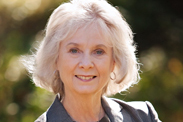 and Social Sciences, became
president of the American Psychological Association. With 150,000 members,
it’s the world’s largest association of psychologists. and Social Sciences, became
president of the American Psychological Association. With 150,000 members,
it’s the world’s largest association of psychologists.
Johnson
has had a 30-year career contributing psychological expertise to medical
research and practice. She’s been a principal investigator on 15 National
Institutes of Health grants, conducting groundbreaking studies on diabetes
management, childhood obesity, family therapy, genetic testing and more. She
has improved the lives of countless children who struggled to control
chronic illness while helping pioneer the field of health psychology, said
Larry Deeb, M.D., former president of the American Diabetes
Association and a member of the medical school’s clerkship faculty in
Tallahassee.
Johnson said the APA should emphasize what
psychologists add as members of primary health-care teams: “We have so much
to contribute as scientists and health-care professionals. It’s
incumbent upon us to make that known.”
Read
more about Johnson’s background and her plans for the APA.
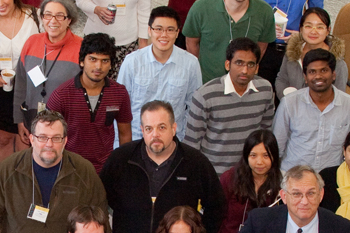
SYMPOSIUM FOCUSES ON TRANSLATIONAL RESEARCH
FSU’s second annual Life Sciences Symposium zeroed in on translational
research, in which basic research discoveries are translated into
technologies and therapies that benefit the patient. In other words, taking
research “from the bench to the bedside.”
“A number of invited
speakers from companies explained key issues of such research,” said
Michael Blaber, chair of the organizing committee and professor in
the Department of Biomedical Sciences, which sponsored the symposium.
“Internal speakers included researchers directly working to achieve
successful translational research, and helped to shed light on local
resources to achieve their research aims. We also had professional
development seminars again for grad students, postdocs and staff.”
In
addition to hearing highlights of translational science at FSU, participants
learned about translational opportunities that are available and how to
implement them. The Grand Rounds speaker was Nicholas Di Prospero, director
of translational medicine at Johnson and Johnson Pharmaceutical Research and
Development.
Speakers and roundtable
participants from the College of Medicine were Professor Pradeep Bhide,
Ph.D.; Clinical Research Projects Director
Jessica De Leon, Ph.D.; Senior Associate Dean for Research Myra Hurt,
Ph.D.; Associate Professor Tim
Megraw, Ph.D. (also on the organizing committee),
Associate Dean for Clinical Research Michael
Muszynski, M.D.; Biomedical Sciences Chair Richard Nowakowski,
Ph.D.; Associate Professor James
Olcese, Ph.D.; Associate Professor Branko Stefanovic,
Ph.D.; and Assistant in Medicine Jacob
VanLandingham, Ph.D.
Among the participants from
elsewhere at FSU were Debra Ann Fadool (Biological Science), Richard Hyson
(Psychology and Program in Neuroscience) and Scott Stagg (Chemistry and
Biochemistry/Institute of Molecular Biophysics), all members of the
organizing committee. Also from FSU were Igor Alabugin (Chemistry and
Biochemistry), Walter Boot (Psychology), Wu-Min Deng (Biological Science),
Greg Dudley (Chemistry and Biochemistry), Ross Ellington (associate vice
president for research), John Fraser (Office of IP Development and
Commercialization), Pamela Keel (Psychology), Teng Ma (Chemical and
Biomedical Engineering), Amy Sang (Chemistry and Biochemistry) and Hengli
Tang (Biological Science).
Participants from outside FSU included
Tiffany Ardley (Florida A&M University), Elizabeth Mazzio (Florida A&M
University), Christine Beeton (Baylor College of Medicine), Thomas Parks
(University of Utah) and Clint Potter (Scripps/NanoImaging Services).
CONFERENCE WILL EXPLORE ‘MAKING HEALTH LAW’
As lawmakers
try to whittle another $1.5 billion from the state’s budget, to what extent
is Floridians’ health included in the conversation? A series of speakers
will address that and related medical-ethics questions in a Florida State
University conference that promises to be thought-provoking.
“Making
Health Law in the Sunshine State: Do (and Should) Ethics Influence Policy
Making?” is scheduled for Feb. 10 at the Alumni Center. It’s sponsored by the
Center for Innovative Collaboration in Medicine & Law and the Florida
Bioethics Network.
“To what extent do legislators and regulators
actually think about the public good other than as it’ll translate into
votes?” asked center Director Marshall Kapp, J.D., MPH.
Among the presenters is Doug Wojcieszak, who proposes that physicians
admit medical errors and apologize for them. He founded the Sorry Works!
Coalition after medical errors resulted in the death of his brother. (He’ll give a similar talk during Grand Rounds at noon Feb. 9 in the College
of Medicine auditorium.)
The all-day conference will feature a
variety of Florida State faculty members. From the College of Medicine will
be Ken Brummel-Smith, M.D.; Les Beitsch,
M.D., J.D.; Michael Nair-Collins, Ph.D.; and Jerry
Williamson, M.D. Also presenting will be former state Sen.
Durell Peaden, M.D., J.D., who was instrumental in the College of
Medicine’s creation.
Find out more about the conference.
Learn more about the Sorry
Works! Coalition.
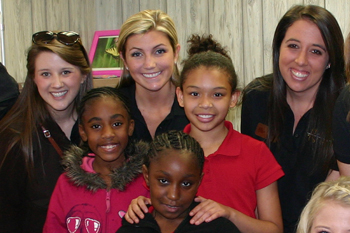
THIS
IS WHY THEY DANCE
A $232,000 check made possible by
student dancers was presented to the College of Medicine in November for the
benefit of children in Gadsden and Leon counties. The donation was the
latest – and largest – from Dance Marathon at Florida State and Children’s
Miracle Network at Shands Children’s Hospital at the University of Florida
The proceeds are part of the record $487,000 raised in 2011 by Dance
Marathon, the largest student-run philanthropy at FSU. Children’s Miracle
Network at Shands annually distributes part of the money to the FSU College
of Medicine for use in pediatric outreach programs. The medical
school uses part of the proceeds to pay for a school-based health program in
Gadsden County designed to address health-care disparities among area
children. In November (see photo), a group of Dance Marathon organizers
drove to Quincy to tour the school clinic that their generosity helps to
fund and to meet some of the children.
The College of Medicine also
shared some of the Dance Marathon proceeds with Tallahassee Memorial
Hospital for the purchase of equipment for its pediatrics unit.
THE NEW DR.
HARTSFIELD
The new dean at the Tallahassee Regional Campus has a
Tallahassee background, the same patient-centered focus as the medical
school – and, by coincidence, the same last name as the former dean. On Jan.
3, Ron Hartsfield, M.D., assumed the role that Mel
Hartsfield, M.D., filled for the past five years.
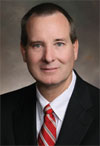 Ron
Hartsfield (pictured here) is a Tallahassee native. (The Hartsfields
say they are distant relatives.) Ron graduated from Florida State with a
degree in psychology. In 1981 he graduated from FSU’s Program in Medical
Sciences, the predecessor of the College of Medicine, before earning his
M.D. at the University of Florida. He did his training at the University of
Alabama, Birmingham and is board-certified in internal medicine and hospice
and palliative medicine. He spent the past four years as medical director at
Big Bend Hospice in Tallahassee. Ron
Hartsfield (pictured here) is a Tallahassee native. (The Hartsfields
say they are distant relatives.) Ron graduated from Florida State with a
degree in psychology. In 1981 he graduated from FSU’s Program in Medical
Sciences, the predecessor of the College of Medicine, before earning his
M.D. at the University of Florida. He did his training at the University of
Alabama, Birmingham and is board-certified in internal medicine and hospice
and palliative medicine. He spent the past four years as medical director at
Big Bend Hospice in Tallahassee.
“He is
highly patient-focused and has lived the mission of the College of Medicine
during his career,” Dean John Fogarty said in a note to
medical school students, faculty and staff. “I believe he is a great fit for
the College of Medicine and the Tallahassee community.”
Mel
Hartsfield, meanwhile, has returned to his previous employer, Archbold
Health System, which has become one of the medical school’s valued partners
in Thomasville, Ga. There he is vice president of medical affairs.
“This will allow him to continue to work with our students and remain
connected to the College of Medicine,” Fogarty said. “I appreciate all the
great work that Mel has done over these past five years as we expanded our
class, supporting the development of our partnership with Thomasville.”
ANOTHER GE/NMF
FELLOWSHIP
Kenisha Pemberton (Class of 2012, Daytona Beach
campus) has
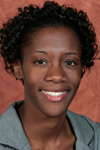 become
the third FSU student to win a prestigious GE/NMF fellowship to work and
study during an all-expenses-paid externship in Ghana. “GE” stands for
General Electric, “NMF” for National Medical Fellowships. become
the third FSU student to win a prestigious GE/NMF fellowship to work and
study during an all-expenses-paid externship in Ghana. “GE” stands for
General Electric, “NMF” for National Medical Fellowships.
The
GE/NMF Medical
Scholars Program is an international fellowship offered annually to
eligible fourth-year minority medical students. They complete a two-month
elective in Ghana or Uganda that focuses on critical regional health-care
needs. Pemberton is among 14 scholars chosen for 2012, from 11 states and 13
medical schools. They were chosen based on the strength of their medical
school recommendations, personal statements, academic achievements and
interviews.
“Not only will I have the opportunity to assist those who
are in dire need of medical services but also visit the land from where my
forefathers came,” said Pemberton, who expects to arrive in Ghana on March
22.
Last year, College of Medicine student Natasha Spencer (now a
resident in OB-GYN at the University of Alabama Medical Center-Birmingham)
traveled to Uganda as a GE/NMF Medical Scholar.
|




 based
settings, now has
based
settings, now has
 and Social Sciences, became
president of the American Psychological Association. With 150,000 members,
it’s the world’s largest association of psychologists.
and Social Sciences, became
president of the American Psychological Association. With 150,000 members,
it’s the world’s largest association of psychologists.
 Ron
Hartsfield (pictured here) is a Tallahassee native. (The Hartsfields
say they are distant relatives.) Ron graduated from Florida State with a
degree in psychology. In 1981 he graduated from FSU’s Program in Medical
Sciences, the predecessor of the College of Medicine, before earning his
M.D. at the University of Florida. He did his training at the University of
Alabama, Birmingham and is board-certified in internal medicine and hospice
and palliative medicine. He spent the past four years as medical director at
Big Bend Hospice in Tallahassee.
Ron
Hartsfield (pictured here) is a Tallahassee native. (The Hartsfields
say they are distant relatives.) Ron graduated from Florida State with a
degree in psychology. In 1981 he graduated from FSU’s Program in Medical
Sciences, the predecessor of the College of Medicine, before earning his
M.D. at the University of Florida. He did his training at the University of
Alabama, Birmingham and is board-certified in internal medicine and hospice
and palliative medicine. He spent the past four years as medical director at
Big Bend Hospice in Tallahassee. become
the third FSU student to win a prestigious GE/NMF fellowship to work and
study during an all-expenses-paid externship in Ghana. “GE” stands for
General Electric, “NMF” for National Medical Fellowships.
become
the third FSU student to win a prestigious GE/NMF fellowship to work and
study during an all-expenses-paid externship in Ghana. “GE” stands for
General Electric, “NMF” for National Medical Fellowships. 